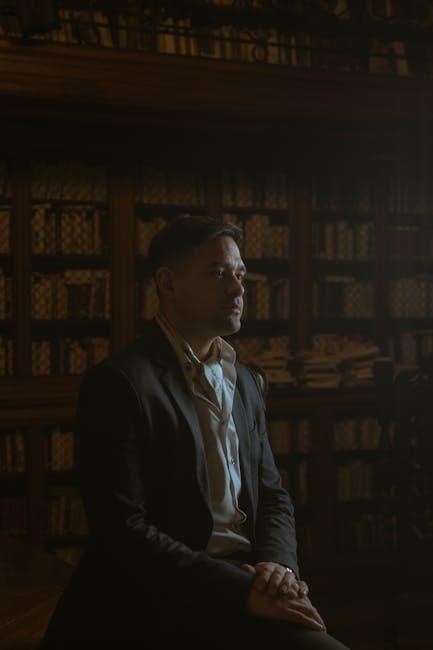Preface
Viktor Frankl’s Man’s Search for Meaning recounts his harrowing experience in Nazi concentration camps‚ exploring the quest for life’s purpose amid unimaginable suffering․
The book reflects on survival‚ psychological insights‚ and the enduring human spirit‚ offering a profound meditation on hope‚ love‚ and the search for meaning in existence․
The Holocaust‚ a systematic persecution and extermination of six million Jews by the Nazi regime‚ serves as the backdrop for Viktor Frankl’s profound narrative․ During World War II‚ millions were subjected to unimaginable atrocities in concentration camps‚ where human dignity was stripped away‚ and survival became a daily struggle․ The camps‚ such as Auschwitz‚ symbolized the depths of human cruelty and the erosion of moral values․ Frankl’s experience within this context provides a unique lens to understand the psychological and emotional toll of such extreme conditions․ His story‚ intertwined with the broader Holocaust narrative‚ highlights the resilience of the human spirit and the enduring quest for meaning even in the face of unparalleled suffering and despair․
Frankl’s Personal Experience in Nazi Concentration Camps
Viktor Frankl’s memoir delves into his harrowing experience in Nazi concentration camps‚ where he endured immense physical and emotional suffering․ Despite losing his family and facing brutal conditions‚ Frankl found solace in his inner strength and the pursuit of meaning․ He observed the psychological responses of fellow prisoners‚ noting how hope and love became essential survival tools․ Frankl’s personal journey illustrates the human capacity to transcend suffering‚ emphasizing the importance of maintaining dignity and purpose even in the most dehumanizing circumstances․ His story is a testament to resilience‚ offering profound insights into the human condition and the search for meaning amidst unimaginable adversity․

Background of the Book
First published in Germany as Ein Psychologe erlebt das Konzentrationslager‚ it was later translated into English as From Death-Camp to Existentialism and Man’s Search for Meaning․ Widely acclaimed‚ it has become a seminal work in existential psychology‚ offering profound insights into the human search for meaning amidst suffering․
First Publication and Subsequent Editions
El Hombre en Busca de Sentido was first published in Germany under the title Ein Psychologe erlebt das Konzentrationslager and later in English as From Death-Camp to Existentialism and Man’s Search for Meaning․ The Spanish edition‚ translated by Diorki‚ was widely acclaimed and saw multiple editions‚ including the 12th edition in 1991․ The book has been translated into over 50 languages‚ with millions of copies sold worldwide․ Its enduring relevance has made it a cornerstone of existential psychology and philosophy‚ earning it a place among the most influential books in the United States‚ as recognized by the Library of Congress․ The work continues to resonate globally‚ offering timeless insights into the human condition and the search for meaning․
The Concept of Logotherapy
Logotherapy‚ developed by Viktor Frankl‚ focuses on the search for life’s meaning and purpose․ It emphasizes that individuals must find their unique mission‚ assuming responsibility toward themselves‚ others‚ and life․ This therapeutic approach highlights three key ways to discover meaning: through work‚ love‚ and suffering․ Frankl argues that even in the most dire circumstances‚ individuals can find meaning‚ which serves as a powerful source of resilience․ The core idea is that life’s meaning is not found in pleasure or power but in purpose and self-transcendence․ Logotherapy has become a significant influence in psychology‚ offering a profound framework for understanding human existence and the pursuit of significance․

Key Themes: Suffering‚ Hope‚ and Meaning
The book explores the profound themes of suffering‚ hope‚ and the search for meaning․ Frankl’s experiences in Nazi concentration camps reveal how suffering‚ though inevitable‚ can be transcended by finding purpose․ Hope emerges as a vital force‚ enabling survival even in the most brutal conditions․ Love‚ too‚ is highlighted as a source of strength and inspiration‚ transcending physical boundaries․ The pursuit of meaning becomes the central focus‚ emphasizing that life’s significance is not diminished by suffering but enhanced by the courage to find purpose amidst adversity․
These themes are deeply intertwined‚ illustrating that suffering can lead to growth and self-discovery․ Frankl’s narrative underscores the resilience of the human spirit‚ showing how hope and the search for meaning can transform even the darkest experiences into opportunities for profound insight and personal fulfillment․

Structure of the Book
Man’s Search for Meaning is divided into two parts: the first recounts Frankl’s experiences in Nazi concentration camps‚ while the second introduces the principles of logotherapy․
Part One: A Psychologist in a Concentration Camp
In this section‚ Viktor Frankl recounts his personal experiences in Nazi concentration camps‚ blending psychological insights with vivid descriptions of daily life․
He explores the psychological phases prisoners endured‚ from initial shock and dehumanization to the struggle for survival and the search for meaning amidst unimaginable suffering․

Frankl reflects on how hope‚ love‚ and dignity became essential tools for survival‚ even in the face of extreme brutality and despair․
His unique perspective as both a prisoner and a psychologist offers a profound understanding of the human spirit’s capacity to endure and find purpose in the darkest conditions․
Part Two: The Basic Concepts of Logotherapy
This section introduces logotherapy‚ a psychotherapeutic method developed by Frankl‚ focusing on the search for life’s meaning as the primary human drive․
Frankl explains that meaning can be found through work‚ relationships‚ or suffering‚ emphasizing that even in despair‚ life retains purpose․
He outlines three key concepts: the will to meaning‚ the freedom to choose one’s attitude‚ and the responsibility to find meaning in every moment․
Logotherapy encourages individuals to transcend suffering by discovering meaning‚ highlighting the human capacity to find purpose even in the most challenging circumstances․
Frankl’s approach emphasizes hope‚ dignity‚ and the uniqueness of each person’s mission in life‚ offering a framework for psychological healing and personal growth․
Viktor Frankl’s Biography
Viktor Frankl was a Holocaust survivor‚ psychiatrist‚ and founder of logotherapy․ His experiences in Nazi camps deeply influenced his philosophy on meaning‚ hope‚ and resilience․
Early Life and Education
Viktor Frankl was born in Vienna‚ Austria‚ in 1905 to a Jewish family․ From an early age‚ he demonstrated a keen interest in psychology and philosophy․ He pursued his academic interests at the University of Vienna‚ where he studied medicine and later specialized in psychiatry and neurology․ Frankl’s intellectual curiosity and passion for understanding human behavior led him to explore the depths of psychology‚ particularly focusing on the human search for meaning․ His early work and writings laid the foundation for his later development of logotherapy‚ a therapeutic approach centered on finding purpose and meaning in life․ Frankl’s educational journey and intellectual pursuits were interrupted by World War II‚ which profoundly shaped his life and work․
Experience in Concentration Camps
Viktor Frankl was imprisoned in Nazi concentration camps during World War II‚ beginning in 1942․ He endured unimaginable suffering‚ including forced labor‚ starvation‚ and the loss of his family․ Despite the brutality‚ Frankl observed the psychological and emotional states of himself and fellow prisoners‚ noting three distinct phases: initial shock‚ adaptation to camp life‚ and liberation․ His experiences deeply influenced his understanding of human resilience and the search for meaning․ Frankl’s time in the camps shaped his belief that even in the most horrific conditions‚ individuals can find purpose through hope‚ love‚ and personal responsibility․ His observations became the foundation of his book‚ offering profound insights into the human spirit’s capacity to endure and transcend suffering․
Development of Logotherapy
Viktor Frankl developed logotherapy‚ a psychotherapeutic method‚ based on his experiences in Nazi concentration camps․ This approach focuses on the search for life’s meaning and the responsibility individuals have toward themselves‚ others‚ and life․ Frankl believed that the primary human drive is the “will to meaning‚” emphasizing that even in suffering‚ meaning can be found․ Logotherapy’s core principles include the meaning of life‚ the meaning of suffering‚ and the importance of hope and love as motors of survival․ Frankl’s method contrasts with psychoanalysis‚ which focuses on the “will to pleasure‚” by emphasizing the uniqueness of each individual’s mission in life․ His work has had a profound impact on psychology and philosophy‚ offering a framework for understanding human resilience and the pursuit of purpose․

The Psychological Experience in the Camps

The psychological experience in the camps included initial shock‚ daily struggles‚ and the enduring hope that sustained prisoners‚ as Frankl vividly describes․
The Initial Phase: Arrival and Shock
The initial phase of arrival in the concentration camps was marked by profound psychological and emotional turmoil․ Prisoners faced immediate separation from loved ones‚ often under brutal conditions‚ leading to a deep sense of loss and disorientation․ The stripping of personal identity‚ replaced by a dehumanizing number‚ further exacerbated the shock․ Many experienced overwhelming grief‚ fear‚ and disbelief as they grappled with the harsh reality of their new existence․ This phase was critical in shaping their mental state‚ as the abrupt transition from normal life to the atrocities of the camps left individuals reeling․ Frankl vividly describes this period as a time of intense vulnerability‚ where the foundations of hope and resilience were tested․ The initial shock laid the groundwork for the psychological struggles that would follow․
The Second Phase: Life in the Camp
Life in the concentration camps was a relentless struggle for survival‚ marked by daily routines of forced labor‚ starvation‚ and brutal treatment․ Prisoners endured physical exhaustion‚ malnutrition‚ and constant fear of death․ Despite these harsh conditions‚ Frankl observed that some individuals found ways to maintain their dignity and hope․ Small acts of kindness‚ such as sharing meager food rations or offering emotional support‚ became vital for survival․ The psychological state of prisoners varied widely‚ with some descending into despair while others found inner strength through reflections on loved ones or future goals․ Frankl emphasizes that even in such extreme conditions‚ the human spirit could transcend suffering by focusing on meaning and purpose․ This phase highlighted the resilience of the human psyche and the importance of inner strength in the face of unimaginable adversity․ The camp environment was a stark reminder of the fragility of life and the enduring power of hope․
The Final Phase: Liberation and Aftermath
The liberation of the concentration camps marked the end of unimaginable suffering‚ but it also brought new challenges for survivors․ Many struggled with physical and emotional trauma‚ grappling with the loss of loved ones and the shattered remains of their lives․ Frankl describes the mixed emotions of relief and despair‚ as survivors faced the harsh reality of a world forever changed․ The aftermath of liberation revealed the profound psychological scars left by the camps‚ yet it also highlighted the resilience of the human spirit․ Frankl reflects on the importance of finding meaning even in the midst of liberation‚ emphasizing that true freedom lies in the ability to choose one’s attitude toward life’s challenges․ This phase underscores the enduring message of hope and the indestructibility of human dignity․
The Search for Meaning
Viktor Frankl’s work explores the universal quest for life’s purpose‚ emphasizing that meaning can be found even in suffering․ He highlights hope‚ love‚ and suffering as key elements of survival and psychological well-being‚ asserting that each individual has a unique mission to fulfill․
The Importance of Purpose
Viktor Frankl emphasizes that purpose is a fundamental driver of human survival and psychological well-being․ He believes that having a clear purpose enables individuals to endure even the most profound suffering‚ as it provides direction and meaning to life․ Frankl’s logotherapy is rooted in the idea that discovering one’s purpose is essential for overcoming adversity and finding fulfillment․ He argues that purpose can be found in work‚ relationships‚ or personal growth‚ and that it is unique to each individual․ Frankl’s own experiences in Nazi concentration camps illustrate how purpose sustained him‚ even in the face of unimaginable hardship․ By focusing on purpose‚ individuals can transcend suffering and find significance in their existence․
Frankl’s philosophy underscores that purpose is not limited to grand achievements but can also be found in everyday acts of kindness‚ creativity‚ and perseverance․ This concept remains central to his teachings and continues to inspire millions worldwide․
The Role of Hope and Love
Hop and love are central themes in Viktor Frankl’s narrative‚ serving as powerful forces that sustained him and others in the concentration camps․ Frankl describes hope as a vital lifeline‚ enabling prisoners to endure unimaginable suffering by envisioning a future beyond their current despair․ Love‚ particularly the memory of loved ones‚ provided emotional strength and a sense of purpose․ Frankl reflects on how these emotions transcended the physical brutality‚ offering a spiritual resilience that helped many survive․ He argues that hope and love are essential human qualities that can transform suffering into a source of meaning․ These concepts remain integral to his logotherapy‚ emphasizing their role in healing and personal growth․ Frankl’s experiences illustrate how hope and love can illuminate even the darkest of human experiences‚ offering a path to inner peace and fulfillment․
The Concept of Suffering
Viktor Frankl explores the concept of suffering in Man’s Search for Meaning‚ describing it as an inevitable part of human existence․ He argues that suffering is not inherently meaningless but can be transformed into a source of growth and self-discovery․ Frankl recounts how‚ even in the brutal environment of concentration camps‚ suffering could lead to profound inner transformation․ He distinguishes between unnecessary suffering‚ which arises from cruelty‚ and necessary suffering‚ which can foster resilience and purpose․ Frankl emphasizes that suffering‚ when endured with dignity‚ can reveal life’s deeper meaning․ His experiences illustrate how suffering‚ though painful‚ can become a catalyst for personal growth and spiritual awakening‚ reshaping one’s perspective on life and its challenges․
The Impact of the Book
Man’s Search for Meaning has achieved global recognition‚ translated into numerous languages‚ influencing psychology‚ philosophy‚ and inspiring millions worldwide with its profound insights on survival and purpose․
Global Recognition and Translations
Viktor Frankl’s Man’s Search for Meaning has achieved unparalleled global recognition‚ transcending linguistic and cultural barriers․ Translated into over 50 languages‚ it has sold millions of copies worldwide‚ becoming a cornerstone of modern philosophical and psychological literature․ Its universal appeal lies in its profound exploration of human resilience‚ hope‚ and the search for meaning‚ resonating with readers from diverse backgrounds․ The book’s influence extends beyond academia‚ inspiring countless individuals to reflect on their own lives and purpose․ Its widespread translation underscores its timeless relevance‚ making it accessible to a global audience and cementing its status as a modern classic․ The book’s impact is further highlighted by its inclusion in lists of the most influential works of the 20th century‚ solidifying its legacy as a transformative read․
Influence on Psychology and Philosophy
Viktor Frankl’s Man’s Search for Meaning has profoundly influenced both psychology and philosophy‚ introducing logotherapy as a revolutionary approach to understanding human existence․ By emphasizing the search for meaning as life’s primary drive‚ Frankl challenged traditional psychoanalytic theories‚ offering a more hopeful and purpose-driven framework․ His ideas have reshaped psychological practice‚ inspiring therapies focused on meaning-making and personal responsibility․ Philosophically‚ the book bridges existentialism with a deeper exploration of hope and suffering‚ providing a unique perspective on human dignity and resilience․ Frankl’s work continues to inspire scholars and practitioners‚ leaving an indelible mark on modern thought and practice‚ and remains a cornerstone in the study of human psychology and philosophy․

Man’s Search for Meaning stands as a testament to the human spirit’s resilience and the enduring quest for purpose․ Viktor Frankl’s profound reflections on hope‚ love‚ and suffering offer timeless wisdom‚ transcending the horrors of the Holocaust․ His logotherapy‚ centered on finding meaning‚ has become a cornerstone of psychological thought‚ inspiring millions worldwide․ The book’s universal themes of dignity‚ responsibility‚ and the search for significance continue to resonate deeply‚ making it a vital work for understanding the human condition․
Translated into numerous languages‚ Frankl’s work remains a powerful reminder of the strength of the human soul․ Its influence extends beyond psychology‚ touching philosophy and spirituality‚ ensuring its relevance for future generations seeking meaning in life’s challenges․